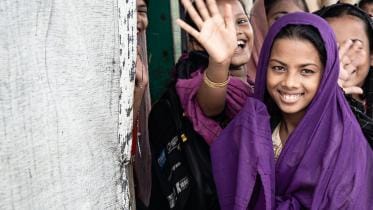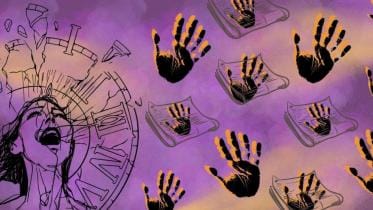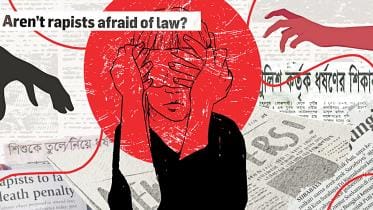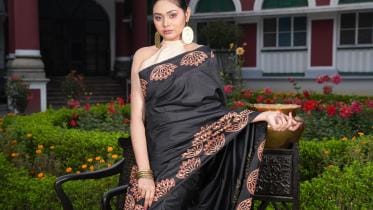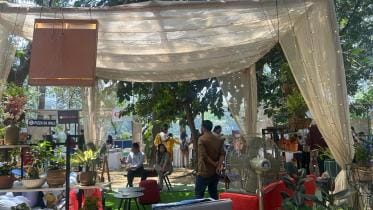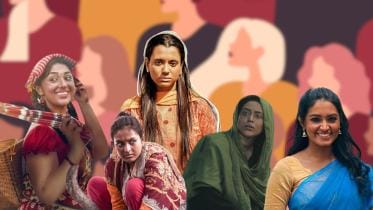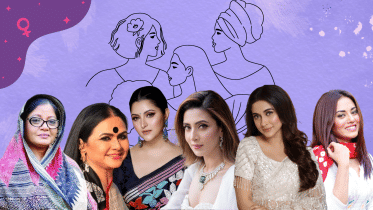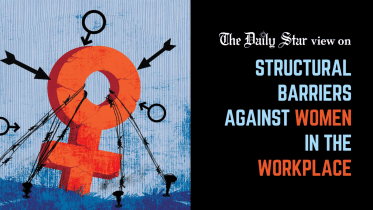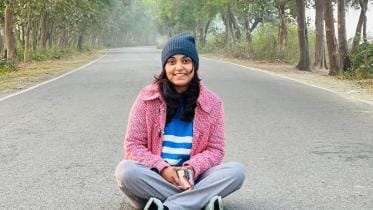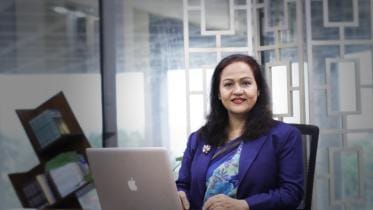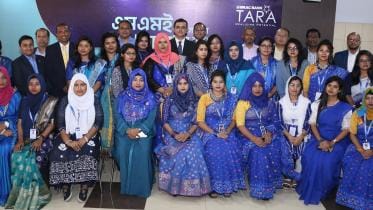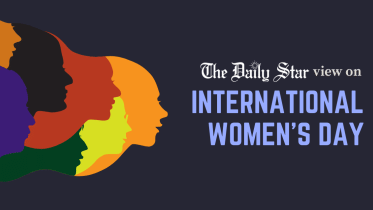International Women's Day
We must prioritise education, safety, opportunity for women and girls in Cox’s Bazar
Women and girls in Rohingya camps face severe challenges amid aid crisis.
8 March 2025, 10:45 AM
Have those in power failed Bangladesh's women?
Female leadership hasn’t dismantled patriarchy or ensured women’s rights.
8 March 2025, 05:00 AM
Retribution
Mohsin would burst into laughter, saying, "Justice for rape? Is that even a crime worthy of justice?"
Rabeya, laughing alongside him, would add, "People expect justice for rape these days? I'm speechless at their naïveté!"
7 March 2025, 18:00 PM
Why this year’s Women’s Day matters
We must acknowledge that gender equality can't be achieved until women are free from violence
7 March 2025, 04:45 AM
Kumudini Handicraft’s tribute to sustainability and women’s empowerment
On 8 March, 2024, the Kumudini Flash Fashion Show unfolded as a tribute to the power of tradition, craftsmanship, and women’s empowerment. Aligning with International Women's Day, this exclusive event not only showcased an exotic seasonal collection of fashion but also reinforced the ethos of Kumudini Handicrafts — symbolising care and empowerment, particularly for women.
13 March 2024, 12:19 PM
Inspire her wellness: A celebration of women's health and empowerment by Dhaka Flow
Amidst the serene backdrop of Baridhara Lakeside Rajuk Park, Dhaka Flow organised its eagerly awaited “Inspire Her Wellness” festival in honour of International Women's Day on 8 and 9 March 2024. This event not only commemorated International Women's Day but also set a precedent for wellness and empowerment initiatives — it was a call to action for inclusion and a celebration of women's multifaceted roles in society.
10 March 2024, 10:04 AM
Dissecting the female gaze in Bollywood
For decades, Bollywood has been primarily driven by the "male gaze," where women were portrayed through the lens of male desire and societal expectations. They presented women in stereotypical roles, often as damsels in distress, sacrificing lovers, or objects of desire. This male gaze manifested in hyper-sexualisation, passive narratives and limited agency. Women rarely drove the plot. Their actions and desires revolved around men, reinforcing traditional gender roles. They were portrayed as lacking control over their lives, with their choices dictated by societal norms or male characters.
8 March 2024, 14:52 PM
Not ‘fair’ at all: Why are fair-skinned actors cast for dark-skinned characters?
In an industry spotlighting talent and storytelling, recent controversies have cast a harsh light on a persistent issue: colourism in casting. The latest uproar emerged when photos of popular actress Sabila Nur surfaced, displaying her intentionally darkened complexion for an upcoming drama, "Bidisha", which is slated to be released today, on the occasion of International Women’s Day. Ironically, this deliberate alteration of the skin complex for the role contradicts the very essence of celebrating this day, sparking a crucial debate over the representation of skin complexion and societal standards.
8 March 2024, 10:11 AM
Empowering voices reflect on progress and challenges of women
Every year, International Women's Day serves as a reminder of the strides women have made in society. It's a day filled with discussions, events, and reflections on women's rights and their integral role in shaping the world. As we commemorate this day once again, prominent figures have shared their perspectives on the ongoing journey towards gender equality.
8 March 2024, 10:07 AM
We must break the glass ceiling, for our own sake
We need to challenge the persistent biases against women in workplace
8 March 2024, 09:04 AM
‘For us, the biggest thing is respect’
"In abroad, they give women's sports the same amount of importance as men's sports. I don't know if the men's and women's sports are getting the same importance, but the situation has improved a lot."
8 March 2024, 02:07 AM
Breaking barriers: Dr Eaysmin Ara Lekha's journey to leadership and gender equality
The notion that women are not suited for leadership positions is gradually dispelled as society advances. Dr Eaysmin Ara Lekha, an academician, writer, researcher and social worker, has dedicated her time and efforts to addressing and actively working to improve academic standards and promote inclusivity throughout her professional life.
7 March 2024, 11:02 AM
Is Bangladesh witnessing a surge in female motorcycle users?
In a nation where traditional gender roles have long dictated societal norms a quiet revolution is underway on the streets of Bangladesh. In recent years, as more and more women are seizing the opportunity to use motorbikes daily, certain cultural perceptions and stereotypes are being effectively challenged.
7 March 2024, 10:52 AM
Brac Bank to recruit 500 female sales officials to serve women entrepreneurs
Brac Bank has set this unique example on the eve of International Women's Day by appointing an all-women sales team.
8 March 2023, 11:45 AM
We need more women at the top
Male-dominated ministries tell a worrying tale of gender equity
8 March 2023, 11:39 AM
Empowering women through banking
Without ensuring a strong relationship with banks broadly financial institutions and women empowerment, the process is merely a side walker in a paper-based dream.
8 March 2023, 11:06 AM
Children and a career: Women footballers adapt their goals
Pregnant players faced slashed or unpaid wages, threats, partial maternity cover and even sacking. It was only in 2021 that FIFA published new rules and the situation is now changing.
8 March 2023, 02:36 AM
300 years needed to reach full gender equality
UN chief stresses the importance of having women's contribution in technology and innovation.
7 March 2023, 18:00 PM
I am a woman and I can’t do it all
It is true that women have broken glass ceilings and gone on to lead exceedingly fulfilling family lives as well and no one argues that they cannot.
6 March 2023, 17:52 PM
What we learnt about SRHR from our work with landless groups
How can a development organisation in Bangladesh truly reach the grassroots?
4 March 2023, 18:00 PM



